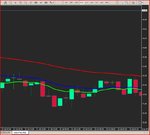Ingot54
Well-known member
- Messages
- 403
- Likes
- 62
After all, if a computer code is valuable enough for someone to steal, and critical enough for a Wall Street firm to go to federal authorities to protect, one would think that regulators would want to know why it is so important.
Yet regulators largely have stood by and allowed this secretive corner of the quantitative trading world to grow ever bigger, without mustering up much of a protest.
Computer-driven trading, where complex buy and sell orders are completed in fractions of a second, now account for 73 percent of all daily stock trades in the United States, according to the Tabb Group, a financial services research firm. Tabb also estimates that the 300 securities firms and hedge funds that specialize in rapid-fire algorithmic trading raked in some $21 billion in profits last year.
Still, there’s little doubt there’s a lot of money to be made from automated trading that relies on complex mathematical formulas to predict momentary price moves in stocks and commodities.
The big fear is that with high frequency trading dominating daily trading activity, it could spark another 1987-style market crash. The doomsayers say that could occur if all these automated trading programs — which operate with almost no adult supervision — begin reacting to the same downward price trends in a stock or commodity. Or high frequency trading firms could worsen a sell-off by refusing to execute trades to protect their own capital, a move that would make it difficult for other investors to quickly exit a falling stock.
Some say there’s already evidence high frequency trading may be playing havoc with the markets. James Angel, a professor at Georgetown University’s McDonough School of Business, says the big end-of-the-day price swings in the major stock indexes that were quite common last fall were probably exacerbated by high frequency trading.
<=========================================================================================>
The prosecutor in the Goldman software-code theft said that the program could be used to “manipulate markets in unfair ways.” He was talking about it falling into the wrong hands. But what’s to prevent Wall Street from doing that?
For those interested in the wash up I suggest you bookmark these, and follow along.
They seem to be on to it.
Thanks to Markus for his post above, that led me to these links.
Five Things You Should Read About High Frequency Trading | Cale In The Keys
Bill King: Automated front-running on an unfathomable scale | GreenLightAdvisor Views
The Algorithmic Trading Podcast ATP Special Edition - Low Latency (featuring Thomas Chippas, Deutsche Bank)
Hopefully I have been able to get my point across to some of you.
Best wishes
Ivan


